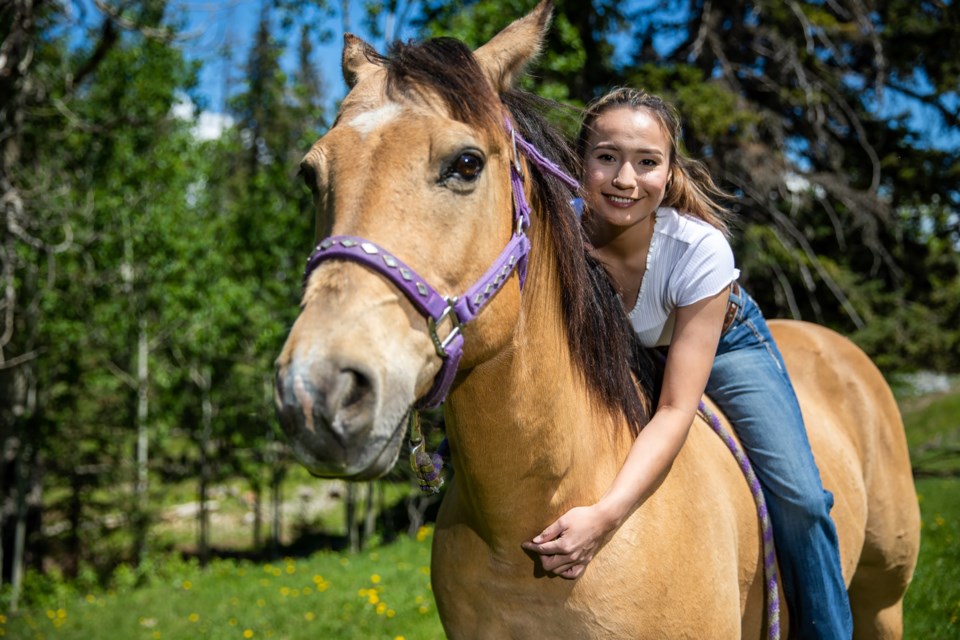Lita Crawler, Chiniki First Nation, barrel racer
“It is challenging, but once you’ve overcome it, you feel proud about yourself. If I don’t ride because I was scared, it bugs me.”
Outdoors and immersed in the fast, heart-pounding rodeo culture, cowgirl Lita Crawler is always moved with a strong sense of Native pride.
The young woman, a champion in her sport, couldn’t be bothered sitting in a office behind a desk, as she knows where in life she is and is going.
“I just want to rodeo,” said Crawler. “You just get this adrenalin once you walk on the track, going grand entry and everything. You just get this adrenalin that you’re just proud and you want to represent what our people can do and what not, especially in the women’s race. Women can race, too.”
A smile grows across Crawler's face and spark glints in her eye talking about horses and the competition she's dedicated her life to.
Out on her family’s quaint ranch on the Stoney Nakoda First Nation, it's on these grounds where she’s trained to become one of the country’s top women barrel racers, relay racers and breakaway ropers.
Walking beside Crawler is her barrel-racing horse, Loui, who's been her partner since 2019.
One prize they've won together, a large buckle from a Wetaskiwin rodeo, proudly shines around Crawler's waist in the June sun as she reminisces about the past.
As a young child, Crawler was nervous around the big, powerful animals, but after her first barrel run riding on her sister’s horse, she became calm and confident.
She’s competed ever since, winning a lot along the way, such as the 2017 Indian National Finals Rodeo, where she placed in each round and won the last go round in the junior barrel racing division.
“I’ve been working with [horses] my whole life and I plan to pursue a career in it and what not, it comes naturally, I guess,” she said.
Crawler's even gotten into stunt work with horses and steers on television, recently for CBC's Heartland, a western Canadian drama about life on the ranch.
But when she's not in front of the small screen's lights and cameras, she's thinking about rodeo.
This season, Crawler is competing in the Indian Relay Race Women's Warrior competition and is looking south at a couple major rodeos. Her dream, one day, is to compete locally at the big show, the Calgary Stampede.
For three or four generations, Crawler’s family has been involved in rodeo, including her father Troy, a champion calf roper and 2018 world champ in senior breakaway.
Crawler's grandmother, as well, competed in the Banff Indian Day races decades ago. Her memory lives on in her granddaughter’s relay racing.
Relays are more traditional and participants wear regalia and paint horses, and Crawler will wear her grandmother’s moccasins on her feet in the speed events.
“I feel they give me good luck, I wear them every single time I race,” said the Woman Warrior relay racer. “It just felt good to have another person in the family racing. It’s like I’m not the only one; it was nice to know and carry on her legacy.”
Crawler said she’s fortunate to have these horses in her life because it helps keep her away from trouble. She said on the reserve, kids get into bad stuff because there is nothing else to do.
“I’m representing the Stoney Nakoda people and I know there are some people here in Morley who wish to learn to ride, but they can’t,” said Crawler.
“When I get older, I just want to have my own area and what not and just get a lot of youth involved with horses who want to ride. Especially get the ladies, the women out here to start riding and make a lady relay team. I feel like if I can do it, they can do it. I want to encourage that even more in my community.”
On June 25, Crawler is travelling to Pendleton, Oregon, for the Green Mile Barrel Race. For it, she's organizing a fundraiser – buy a square for $15 at a chance to win an iPhone 12. E-transfers should be sent to [email protected].
On the first day of racing, Crawler is going to wear red to raise awareness about Missing and Murdered Indigenous Women and Children.
On the second day, she's planning to wear orange, in memory of the 215 Indigenous children whose remains were unearthed at a residential school in Kamloops this year.



